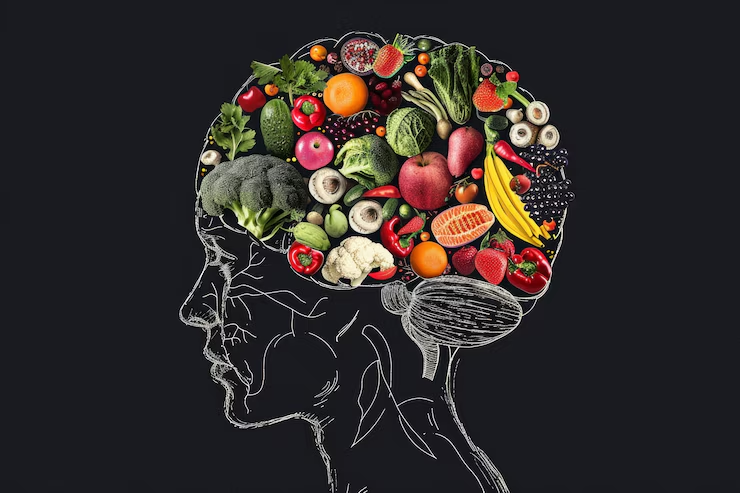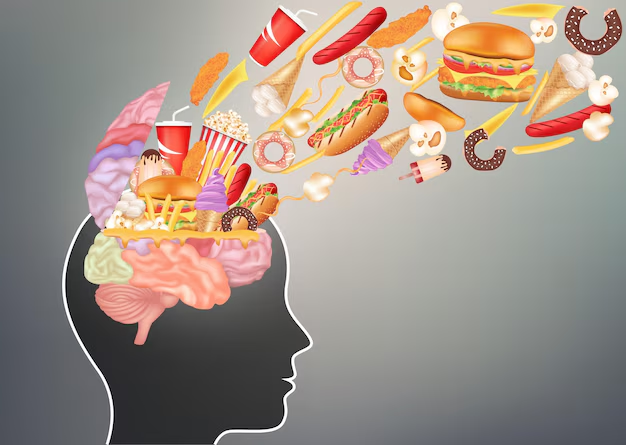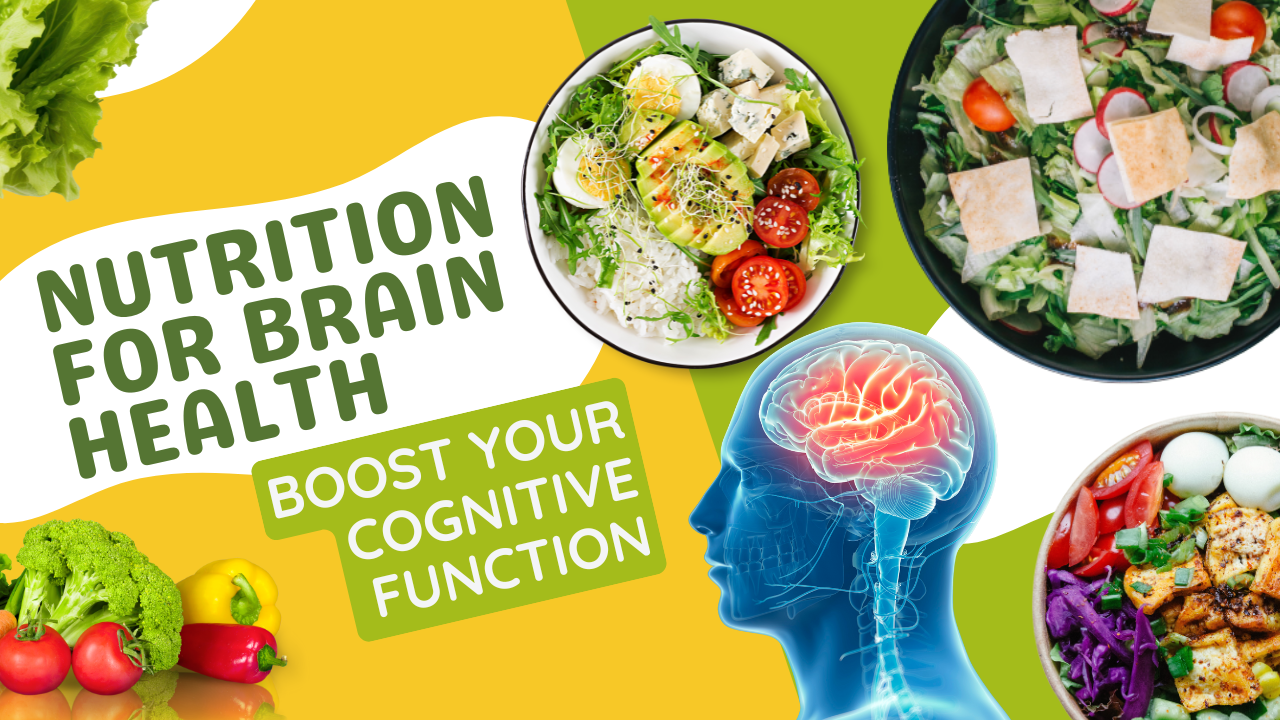The brain is one of the most complex organs in the human body, crucial for our daily functions like memory, emotions, and decision-making. To perform at its best, the brain requires proper nutrition, just like the rest of our body. Without the right nutrients, cognitive abilities can suffer.
Nutrition for brain health plays a vital role in maintaining mental clarity, focus, and overall cognitive function. Key nutrients like omega-3 fatty acids, antioxidants, and vitamins support brain structure and function, helping to protect against cognitive decline.
Including a balanced diet rich in these essential nutrients is crucial for long-term brain health. By nourishing the brain with the right foods, we can enhance our mental performance, improve focus, and promote better emotional well-being. Prioritizing nutrition for brain health helps ensure that the brain functions optimally throughout our lives.
In the following sections, we will delve into how various nutrients and foods can significantly improve brain health, enhance cognitive performance, and even protect against degenerative brain diseases like Alzheimer’s and Parkinson’s.
The Brain and Its Nutritional Needs

Basic Brain Function
The brain requires a constant supply of nutrients to function optimally. It is responsible for everything from basic motor functions, like walking, to higher cognitive abilities such as decision-making, reasoning, and problem-solving. The brain is made up of billions of neurons that communicate through electrical signals, and these neurons require energy and specific nutrients to work properly.
Energy Requirements for the Brain
The brain uses about 20% of the body’s energy, despite making up only about 2% of total body weight. It relies on glucose as its primary energy source, which is why maintaining a balanced diet that provides adequate glucose is essential. However, the brain also benefits from other fuel sources, such as ketones, which are derived from healthy fats when carbohydrates are in limited supply.
Nutrients Crucial for Brain Health
Numerous studies have shown that a deficiency in certain nutrients can impair brain function, while a diet rich in specific nutrients can enhance cognitive abilities. The next section will explore the top nutrients that are essential for brain health.
Top Nutrients for Optimal Brain Function
Omega-3 Fatty Acids
One of the most important nutrients for brain health is omega-3 fatty acids. These healthy fats are the building blocks of brain cells and are critical for maintaining the integrity of the cell membranes in the brain. Omega-3 fatty acids, particularly DHA (docosahexaenoic acid), play a crucial role in learning, memory, and overall cognitive function. Studies have also shown that omega-3s can reduce inflammation in the brain, potentially lowering the risk of neurodegenerative diseases like Alzheimer’s.
Antioxidants (Vitamins C and E)
Antioxidants are substances that protect the brain from oxidative stress, a condition that can damage brain cells and accelerate aging. Vitamins C and E are two powerful antioxidants that can help protect the brain from free radical damage. Vitamin C also supports the production of dopamine, a neurotransmitter that regulates mood and motivation. Vitamin E, on the other hand, helps to prevent cognitive decline by protecting neurons from oxidative damage.
B Vitamins (B6, B12, Folate)
B vitamins are essential for brain health and energy metabolism. Vitamin B6 is involved in the production of neurotransmitters, which are chemicals that transmit signals in the brain. Vitamin B12 and folate are crucial for maintaining healthy brain cells and preventing homocysteine buildup, which is associated with an increased risk of cognitive decline. Adequate levels of these B vitamins are necessary for memory, mood, and cognitive function.
Vitamin D
Vitamin D is often referred to as the “sunshine vitamin,” as it is produced in the skin in response to sunlight. Research has shown that vitamin D is important for maintaining brain function, and deficiency in vitamin D has been linked to cognitive decline and an increased risk of depression and other mood disorders. Adequate levels of vitamin D support the health of brain cells and improve the brain’s ability to process information.
Magnesium
Magnesium is involved in over 300 biochemical reactions in the body, including those that affect brain function. It helps regulate neurotransmitters, which are responsible for sending signals in the brain. Magnesium has been shown to improve memory and cognitive performance and may reduce the risk of age-related cognitive decline. Additionally, magnesium has a calming effect on the brain, helping to reduce anxiety and improve sleep quality.
Zinc
Zinc plays an important role in brain function by supporting the structure of brain cells and facilitating communication between neurons. It is also involved in the regulation of neurotransmitters and can help protect the brain from oxidative damage. Zinc deficiency has been associated with cognitive impairments and an increased risk of developing neurodegenerative diseases.
Iron
Iron is vital for cognitive development, especially during childhood and adolescence. It supports the production of hemoglobin, which carries oxygen to the brain. Without adequate iron, brain function can suffer, leading to problems with concentration, memory, and overall cognitive performance.
Foods That Promote Brain Health
To ensure you’re getting the right nutrition for brain health, it’s important to include specific foods in your diet that are rich in these essential nutrients. Below are some of the top brain-boosting foods:

Fatty Fish
Fatty fish like salmon, mackerel, sardines, and trout are excellent sources of omega-3 fatty acids. Regular consumption of these fish can improve memory, enhance cognitive performance, and protect against age-related cognitive decline.
Leafy Greens and Vegetables
Leafy greens like spinach, kale, and broccoli are rich in antioxidants, vitamins, and minerals that support brain health. These vegetables are also high in folate, a B vitamin that plays a critical role in brain function and mood regulation.
Berries and Fruits
Berries such as blueberries, strawberries, and blackberries are packed with antioxidants that protect the brain from oxidative stress. They also contain anthocyanins, which have been shown to enhance memory and cognitive function.
Nuts and Seeds
Nuts and seeds, particularly walnuts, almonds, and flaxseeds, are rich in healthy fats, omega-3 fatty acids, and antioxidants. Walnuts, in particular, are known for their brain-boosting properties and have been linked to improved cognitive function and memory.
Whole Grains
Whole grains like oats, quinoa, and brown rice provide a steady supply of glucose to the brain. They also contain B vitamins, which are essential for energy production and brain function.
Dark Chocolate
Dark chocolate, particularly varieties with high cocoa content (70% or more), contains flavonoids, which have antioxidant properties and promote brain health. Moderate consumption of dark chocolate has been linked to improved memory and cognitive function.
The Role of Hydration in Brain Function
Hydration is just as important as nutrition when it comes to supporting brain health. Since the brain is composed of about 75% water, even mild dehydration can impact how well it functions. Proper hydration helps maintain focus, alertness, and overall cognitive performance.
When the body lacks water, it can lead to problems such as difficulty concentrating, forgetfulness, and slower thinking or reaction times. This makes staying hydrated a key factor in maintaining mental clarity and energy throughout the day.
To support brain health, it’s important to drink water regularly and be mindful of drinks that can cause fluid loss. Limiting caffeine and alcohol—both of which can dehydrate the body—helps maintain optimal hydration. Combined with a balanced diet rich in brain-supportive nutrients, good hydration habits contribute to better mental function and long-term cognitive well-being.
The Impact of a Poor Diet on Brain Health

A poor diet can seriously harm your brain health. Eating too many processed foods, sugary snacks, and unhealthy fats may cause inflammation in the brain, which can impair thinking, memory, and mood. These foods have also been linked to a higher risk of mental health disorders, such as anxiety and depression.
High sugar intake, in particular, has been shown to negatively affect memory and learning. Over time, this can reduce your ability to focus and retain new information, making everyday tasks more challenging. That’s why making better food choices is vital.
Nutrition for brain health isn’t just about the brain—it’s also about the gut. Poor dietary habits can upset gut health, disrupting the gut-brain axis, the communication network between your digestive system and brain. Supporting both with healthy foods can improve mental clarity, emotional balance, and overall brain function.
Supplements for Brain Health
While whole foods are the best source of nutrients, supplements can play a helpful role in supporting brain health—especially when your diet falls short in key areas. They offer a convenient way to fill nutritional gaps that may affect mental performance and long-term cognitive well-being.
Common brain-supporting supplements include omega-3 fatty acids, which are known for improving memory and focus. Ginkgo biloba is often used to support circulation and brain function, while curcumin from turmeric has anti-inflammatory properties that may protect brain cells. Antioxidants like vitamin E also help reduce oxidative stress that can damage brain tissue over time.
Including these supplements wisely can enhance your overall approach to nutrition for brain health. However, they should complement—not replace—a balanced diet rich in fruits, vegetables, healthy fats, and proteins that naturally nourish the brain and body. Always consult a healthcare provider before starting new supplements.
The Link Between Nutrition and Mental Health
What we eat has a direct impact on our mental health. A diet rich in whole foods, healthy fats, and nutrient-packed vegetables supports better mood, emotional balance, and mental clarity. These foods provide the essential vitamins and minerals the brain needs to function well and manage stress effectively.
In contrast, diets high in processed foods, sugar, and unhealthy fats have been linked to a higher risk of mood disorders such as depression and anxiety. These poor eating habits can also contribute to cognitive decline over time, affecting memory and focus.

Focusing on nutrition for brain health means choosing foods that nourish both the body and mind. A well-balanced diet not only improves mental performance but also helps protect emotional well-being. Making thoughtful food choices every day can be a powerful tool in supporting long-term mental and emotional health.
Strategies for Including Brain-Boosting Foods into Your Diet
If you’re looking to improve your brain health, it’s important to make brain-boosting foods a regular part of your diet. Here are some tips for incorporating more nutrition for brain health into your meals:
Plan meals around whole, nutrient-dense foods.
Snack on nuts, seeds, or berries throughout the day.
Replace processed foods with omega-3-rich fatty fish.
Drink plenty of water to stay hydrated and support brain function.
Conclusion
In conclusion, nutrition for brain health is a powerful way to support your mind at every stage of life. Eating a balanced diet rich in essential nutrients—like omega-3 fatty acids, B vitamins, and antioxidants—helps protect your brain, improve focus, and reduce the risk of age-related cognitive decline.
These nutrients work together to support memory, mood, and overall mental clarity. Whether your goal is to stay sharp, boost concentration, or lower your chances of developing cognitive disorders, the right foods make a big difference.
By prioritizing nutrition for brain health, you’re giving your brain the fuel it needs to perform at its best. Whole foods such as leafy greens, fatty fish, nuts, berries, and whole grains offer long-term benefits that go beyond just physical health—they’re key to maintaining a strong, focused, and healthy mind well into the future.
FAQs
What are the best foods for brain health ?
The best foods for brain health are those rich in essential nutrients that support cognitive function.
Key foods include:
Fatty fish (like salmon, mackerel, and sardines) for omega-3 fatty acids.
Leafy greens (like spinach and kale) for B vitamins and antioxidants.
Berries (like blueberries and strawberries) for their high antioxidant content.
Nuts and seeds (like walnuts and flaxseeds) for omega-3s and vitamin E.
Whole grains (like oats and quinoa) for a steady supply of glucose.
These nutrient-dense foods can help improve memory, focus, and overall brain function.
How does omega-3 affect brain health ?
Omega-3 fatty acids, particularly DHA, are essential for brain health as they are critical components of brain cell membranes. DHA helps improve communication between brain cells, supporting memory, focus, and cognitive function. Omega-3s also have anti-inflammatory properties, which may protect the brain from conditions like Alzheimer’s and other neurodegenerative diseases. Regular intake of omega-3s through foods like fatty fish or supplements can significantly enhance brain health.
Can a poor diet lead to cognitive decline ?
Yes, a poor diet can contribute to cognitive decline. Diets high in processed foods, added sugars, and unhealthy fats are linked to increased inflammation in the brain, which can impair cognitive function and increase the risk of mental health disorders. Additionally, deficiencies in essential nutrients like omega-3s, B vitamins, and antioxidants can negatively impact memory, learning, and overall brain health. Maintaining a nutrient-rich, balanced diet is essential for preserving brain function as we age.
Is hydration important for brain health ?
Yes, hydration is crucial for brain health. The brain is composed of about 75% water, and staying hydrated helps maintain proper brain function. Dehydration can lead to difficulty concentrating, impaired memory, and slower reaction times. To support optimal cognitive function, it’s important to drink enough water throughout the day and avoid excessive consumption of caffeine or alcohol, which can contribute to dehydration.
Should I take supplements for brain health ?
Supplements can be beneficial if you have specific nutrient deficiencies or if you’re unable to get enough brain-boosting nutrients from your diet. Common supplements for brain health include omega-3 fatty acids, vitamin D, B vitamins (such as B6, B12, and folate), and antioxidants like vitamin E. However, it’s always best to consult with a healthcare provider before starting any new supplements, as they can interact with other medications or conditions.


